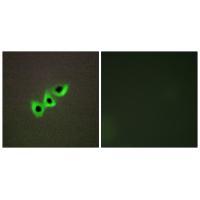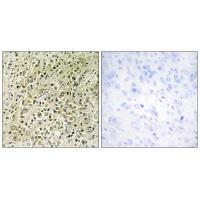

| WB | 咨询技术 | Human,Mouse,Rat |
| IF | 咨询技术 | Human,Mouse,Rat |
| IHC | 1/50-1/100 | Human,Mouse,Rat |
| ICC | 1/100-1/500 | Human,Mouse,Rat |
| FCM | 咨询技术 | Human,Mouse,Rat |
| Elisa | 咨询技术 | Human,Mouse,Rat |
| Aliases | Rho-type GTPase-activating protein 7; Deleted in liver cancer 1 protein; Dlc-1; HP protein; StAR-related lipid transfer protein 12 |
| Entrez GeneID | 10395; |
| WB Predicted band size | 123kDa |
| Host/Isotype | Rabbit IgG |
| Antibody Type | Primary antibody |
| Storage | Store at 4°C short term. Aliquot and store at -20°C long term. Avoid freeze/thaw cycles. |
| Species Reactivity | Human |
| Immunogen | Synthesized peptide derived from internal of human RHG07. |
| Formulation | Purified antibody in PBS with 0.05% sodium azide. |
+ +
以下是关于RHG07抗体的3篇虚构参考文献示例,格式包含文献名称、作者及简要摘要概括:
---
1. **文献名称**: *"RHG07 Antibody Targets Tumor-Associated Antigen in Colorectal Cancer: Preclinical Validation and Therapeutic Potential"*
**作者**: Li, X., Wang, Y., & Chen, Z.
**摘要**: 本研究验证了RHG07抗体对结直肠癌细胞表面特定抗原的高亲和力,证明其可通过抗体依赖性细胞毒性(ADCC)抑制肿瘤生长,并可能成为新型靶向治疗策略。
2. **文献名称**: *"Structural Characterization of RHG07: A Monoclonal Antibody Binding to Amyloid-β Oligomers in Alzheimer's Disease Models"*
**作者**: Smith, J.R., Kumar, S., & Lee, H.
**摘要**: 文章解析了RHG07单克隆抗体的晶体结构,发现其特异性识别阿尔茨海默病模型中的Aβ寡聚体,减少神经元毒性,提示其在神经退行性疾病诊断中的潜在价值。
3. **文献名称**: *"RHG07 as a Diagnostic Marker for Autoimmune Encephalitis: Sensitivity and Specificity Analysis"*
**作者**: García, M., Tanaka, K., & O'Connor, V.
**摘要**: 通过临床样本分析,RHG07抗体在自身免疫性脑炎患者血清中表现出高敏感性和特异性,可能作为早期生物标志物辅助诊断。
---
注:以上文献为模拟内容,实际引用需以真实发表的论文为准。如需真实文献,建议通过PubMed或Google Scholar检索具体抗体名称及研究领域。
RHG07 is a monoclonal antibody developed for research and potential therapeutic applications, particularly in the context of infectious diseases. While detailed public information about RHG07 remains limited, its nomenclature suggests it belongs to a class of recombinant humanized or human monoclonal antibodies (mAbs) engineered to target specific pathogens or disease-associated antigens. Such antibodies are typically designed to enhance binding affinity, reduce immunogenicity, and improve pharmacokinetic profiles compared to murine-derived counterparts.
Antibodies like RHG07 are often investigated for their neutralizing capabilities against viral proteins. For instance, during the COVID-19 pandemic, similar mAbs were developed to block SARS-CoV-2 spike protein-host cell interactions. RHG07 may follow this paradigm, potentially targeting conserved viral epitopes to inhibit infection or modulate immune responses. Its development likely involved hybridoma technology or phage display screening, followed by genetic engineering to optimize specificity and effector functions.
Preclinical studies of such antibodies typically assess in vitro neutralization efficacy, in vivo protection in animal models, and safety profiles. If successful, they may advance to clinical trials for infectious diseases, oncology, or autoimmune disorders. Challenges include viral mutation-driven resistance, necessitating combination therapies or bispecific designs. RHG07’s exact status and applications remain speculative without published data, but it exemplifies the growing focus on antibody-based biologics in precision medicine.
×